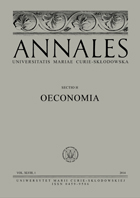From Learning “Doing the Work of a Paramedic” to “Being a Paramedic” – the Results of Research on Students of the Last Year of Wroclaw Medical University
From Learning “Doing the Work of a Paramedic” to “Being a Paramedic” – the Results of Research on Students of the Last Year of Wroclaw Medical University
Author(s): Barbara Chomątowska, Jolanta Grzebieluch, Iwona Janiak-Rejno, Dorota Kiedik, Agnieszka Żarczyńska-DobieszSubject(s): Economy, Human Resources in Economy
Published by: Wydawnictwo Naukowe Uniwersytetu Marii Curie-Sklodowskiej
Keywords: paramedics; values; motivations; competencies; professional identity
Summary/Abstract: Theoretical background: The limited number of scientific studies on the specifics of the professional identity formation of paramedics makes it possible to conclude that this subject is insufficiently identified. In addition, the growing demand for medical professions, including paramedics, has led the authors to fill the research gap related to the recognition of the real professional identity of future representatives of the discussed profession. Accepting the fact that professional identity of paramedics is formed at different stages of the professional life of the person practicing the job, the authors took up the challenge of looking at the problem in question from the perspective of, inter alia, the identification of key determinants of the choice of this profession, the accompanying values and motivations, as well as the degree of fulfilment of expectations from the process of preparation for this profession offered in the framework of higher education.Purpose of the article: The article draws attention to a very important stage in the process of shaping the professional identity of paramedics, which is the higher-level of education. Its purpose is to recognize the opinions of students of the last year of emergency medical care about their values, motivations that determined the choice of this field of study and the competences acquired by them. These elements determine the degree of satisfaction of students with the broadly understood process of study and, consequently, the forming of their professional identity.Research methods: The article refers to the results of own research conducted among students of the last year in the field of medical rescue service at the Medical University of Wroclaw. The study covered a four-year period and was done each time in the second quarter of 2017, 2018, 2019 and 2020. The authors of the article conducted a diagnostic survey using the authors’ survey questionnaire.Main findings: Future paramedics, while undertaking higher studies in the said field, though internally convinced that their decisions were right, were guided by different values and motivations. Among the most important were the desire to pursue their passions, fulfil dreams, care for their own health, family and relationships with friends. Work as a value and the directly related need to help others, as well as the resulting economic benefits, were not considered the most important for future paramedics at that moment. The identified dissonance pertaining to the degree of fulfiment of expectations towards the process of education and the degree of benefis gained from that process demonstrate a limited level of satisfaction from preparation for the studied profession.Implications/Recommendations: The attempt made in the article to insight into the professional identity of future paramedics, and in particular the weaknesses and concerns identified in relation to the learned profession, certainly invite further research that can contribute to both improving the current education system and taking action by further actors in the subsequent stages of shaping this identity. Taking into account the concerns identified by future paramedics and the enormity of tasks they are going to face, the professional predisposition as well as psychophysical characteristics of potential candidates should be taken into account at the stage of recruitment for the studies. In this context the teaching time should be increased for such subjects as psychology, patient communication and stress management. So far, the Polish education system of paramedics offers no planned career path, no vertical differentiation and promotion during professional work, which would certainly be a motivating factor. Continuous professional development should be an important element, which could enable them to develop their professional identity from learning “doing the work of a paramedic” to “being a paramedic”.
Journal: Annales Universitatis Mariae Curie-Skłodowska, Sectio H Oeconomia
- Issue Year: LV/2021
- Issue No: 2
- Page Range: 33-48
- Page Count: 16
- Language: English

